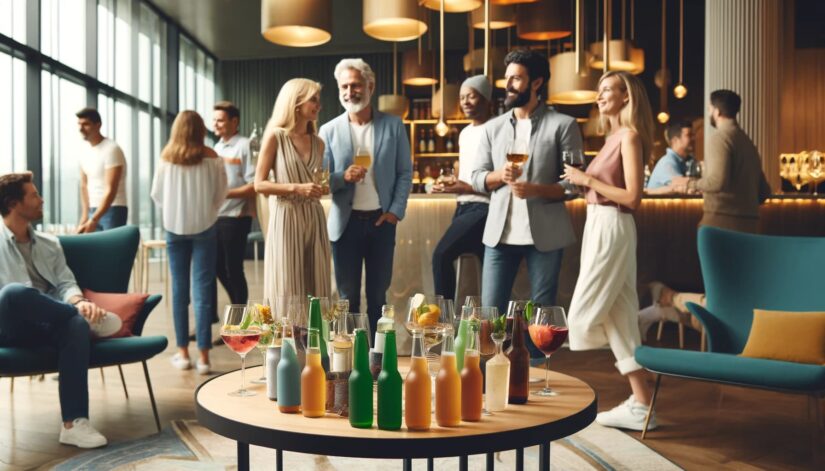In a world where health and conscious lifestyles are becoming increasingly important, the rise in popularity of soft drinks marks a significant shift in social norms and consumer habits. This growing sector not only meets the needs of those who abstain from alcohol for health reasons, but also attracts a wider audience looking for sophisticated, adult-oriented beverage options without the effects of alcohol. The first part of the article explores the cultural shift toward soft drinks, their health benefits, and the technological advances that are driving this trend.
A Cultural Shift Towards Mindful Consumption
The movement towards non-alcoholic beverages is not just about eliminating alcohol from your diet, it is about taking a completely new look at what a drinking culture is. The “sober curious” movement, a term that has gained momentum over the past few years, reflects this shift. It refers to people who are not necessarily abstinent, but who are re-evaluating their relationship to alcohol, choosing to abstain more often because of the health benefits, clarity, and increased sense of control.
Social parties and corporate events are increasingly offering non-alcoholic beverages, reflecting a broader cultural perception that alcohol is not necessary for celebration or socializing. This shift is supported by a growing range of non-alcoholic products that rival their alcoholic counterparts in taste, quality and complexity, making the choice to give up alcohol easier and more enjoyable than ever before.
Health Benefits of Non-Alcoholic Beverages
One of the primary reasons for the rise of non-alcoholic drinks is the undeniable health benefits they offer. Unlike traditional alcoholic beverages, non-alcoholic alternatives are usually lower in calories, sugar, and, obviously, alcohol content, which can contribute to better overall health outcomes. Drinking non-alcoholic beverages can lead to:
- Reduced calorie intake: Non-alcoholic drinks often contain fewer calories than their alcoholic equivalents, aiding in weight management and reducing the risk of obesity.
- Decreased risk of chronic diseases: Regular consumption of alcoholic beverages has been linked to an increased risk of liver disease, heart disease, and several types of cancer. Non-alcoholic options eliminate these risks.
- Improved mental health: Alcohol has been shown to exacerbate symptoms of anxiety and depression in some individuals. Non-alcoholic beverages provide a social lubricant without the potential negative impacts on mental health.
These health benefits are compelling, especially to health-conscious consumers who prioritize wellness in every aspect of their lives, including their beverage choices.
Technological Advancements in Beverage Production
The production of soft drinks has come a long way thanks to technological advances. Modern methods allow producers to create soft drinks that retain the flavor and complexity of ethanol-free alcoholic beverages. One common method is vacuum distillation, where alcohol is gently removed at lower temperatures, helping to preserve the flavors and aromas of the base beverage. Another method is the use of reverse osmosis, which separates the alcohol from the rest of the beverage on a molecular level.
These technologies ensure that non-alcoholic wines and beers are no longer just pale imitations of real beverages, but instead are high-quality options that can stand on their own. This has been a decisive factor in changing the perception of soft drinks and making them a legitimate choice for discerning consumers.
Why Choose Non-Alcoholic?
The reasons people choose non-alcoholic options vary widely. For some, it’s health-related, for others, it’s about staying clear-headed, and for many, it’s part of a broader lifestyle choice that prioritizes well-being.
Production Techniques
Non-alcoholic wines and beers undergo similar fermentation processes as alcoholic ones but include an additional step to remove alcohol while preserving flavor and aroma.
Health Benefits
- Lower Caloric Intake
- No Alcohol-Related Health Risks
- Inclusive Drinking Options
Understanding Non-Alcoholic Beverages
| Type | Description |
| Non-Alcoholic Beer | Brewed to taste like traditional beers without the intoxicating effects. |
| Non-Alcoholic Wine | Made using traditional winemaking methods, then de-alcoholized. |
Frequently Asked Questions (FAQ)
What does non-alcoholic wine taste like?
It shares many characteristics with alcoholic wine, including flavors and aromas, but without the alcohol content.
How is non-alcoholic beer made?
Similar to regular beer, but alcohol is removed post-fermentation while retaining flavor.
Are there health benefits to drinking non-alcoholic beverages?
Yes, they offer similar health benefits to their alcoholic counterparts but without the risks associated with alcohol consumption.
For more insights on lifestyle choices and their impact on health, check out our detailed discussions.
Learn about technology and innovation in beverage production and other fields.
